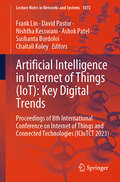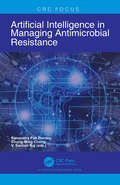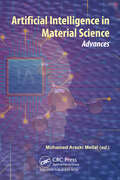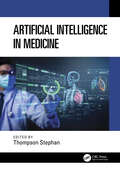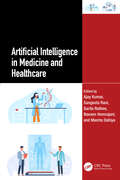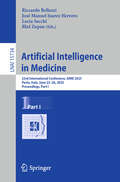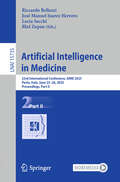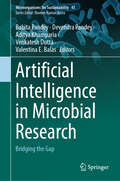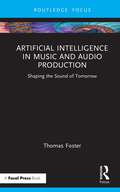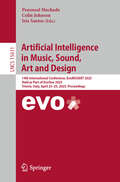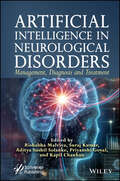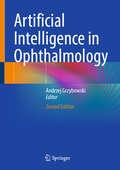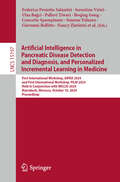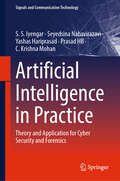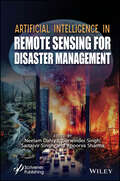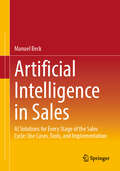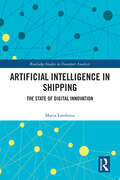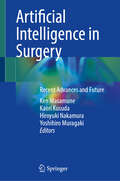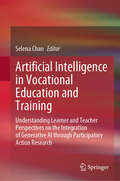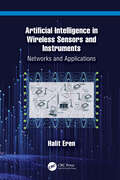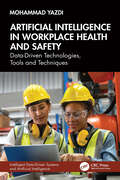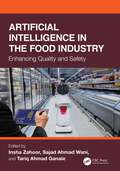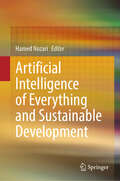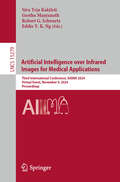- Table View
- List View
Artificial Intelligence in Internet of Things: Proceedings of 8th International Conference on Internet of Things and Connected Technologies (ICIoTCT 2023) (Lecture Notes in Networks and Systems #1072)
by Ashok Patel Nishtha Kesswani Sushanta Bordoloi Frank Lin David Pastor Chaitali KoleyThis book is a collection of high-quality research papers presented at 8th International Conference on Internet of Things and Connected Technologies (ICIoTCT 2023), held at National Institute of Technology (NIT), Mizoram, India, during 29–30 September 2023. This book presents recent advances on IoT and connected technologies. This book is designed for marketing managers, business professionals, researchers, academicians, and graduate-level students seeking to learn how IoT and connecting technologies increase the amount of data gained through devices, enhance customer experience, and widen the scope of IoT analytics in enhancing customer marketing outcomes.
Artificial Intelligence in Managing Antimicrobial Resistance
by Ramendra Pati Pandey Chung-Ming Chang V. Samuel RajThis volume reviews the use of machine learning (ML) to predict antibiotic resistance in pathogens based on gene content and genome composition as data sets comprising hundreds or thousands of pathogen genomes become available. One of the main goals of this work is to promote the use of ML in front-line contexts while simultaneously emphasizing the additional improvements that are required to use these techniques in a secure and confident manner. Given the variety of quantitative and qualitative laboratory indicators of AMR, the issue of what to anticipate is not an easy one.This book is intended for academia, students of medical science, microbiology, biology, and biotechnology, as well as experts and scientists working in the fields of infectious diseases, government health organizations, and medicine.
Artificial Intelligence in Material Science: Advances
by Mohamed Arezki MellalArtificial intelligence (AI) in the form of machine learning and nature-inspired optimization algorithms are vastly used in material science. These techniques improve many quality metrics, such as reliability and ergonomics.This book highlights the recent challenges in this field and helps readers to understand the subject and develop future works. It reviews the latest methods and applications of AI in material science. It covers a wide range of topics, including Material processing; Properties prediction; Conventional machining, such as turning, boring, grinding, and milling; non-conventional machining, such as electrical discharge machining, electrochemical machining, laser machining, plasma machining, ultrasonic machining, chemical machining, and water-jet machining; Machine tools, such as programming, design, and maintenance. AI techniques reviewed in the book include Machine learning, Fuzzy logic, Genetic algorithms, Particle swarm optimization, Cuckoo search, Grey wolf optimizer, and Ant colony optimization.
Artificial Intelligence in Medicine
by Thompson StephanIn the ever-evolving realm of healthcare, Artificial Intelligence in Medicine emerges as a trailblazing guide, offering an extensive exploration of the transformative power of Artificial Intelligence (AI). Crafted by leading experts in the field, this book sets out to bridge the gap between theoretical understanding and practical application, presenting a comprehensive journey through the foundational principles, cutting-edge applications, and the potential impact of AI in the medical landscape.This book embarks on a journey from foundational principles to advanced applications, presenting a holistic perspective on the integration of AI into diverse aspects of medicine. With a clear aim to cater to both researchers and practitioners, the scope extends from fundamental AI techniques to their innovative applications in disease detection, prediction, and patient care.Distinguished by its practical orientation, each chapter presents actionable workflows, making theoretical concepts directly applicable to real-world medical scenarios. This unique approach sets the book apart, making it an invaluable resource for learners and practitioners alike.Key Features:• Comprehensive Exploration: From deep learning approaches for cardiac arrhythmia to advanced algorithms for ocular disease detection, the book provides an in-depth exploration of critical topics, ensuring a thorough understanding of AI in medicine.• Cutting-Edge Applications: The book delves into cutting-edge applications, including a vision transformer-based approach for brain tumor detection, early diagnosis of skin cancer, and a deep learning-based model for early detection of COVID-19 using chest X-ray images.• Practical Insights: Practical workflows and demonstrations guide readers through the application of AI techniques in real-world medical scenarios, offering insights that transcend theoretical boundaries.This book caters to researchers, practitioners, and students in medicine, computer science, and healthcare technology. With a focus on practical applications, this book is an essential guide for navigating the dynamic intersection of AI and medicine. Whether you are an expert or a newcomer to the field, this comprehensive volume provides a roadmap to the revolutionary impact of AI on the future of healthcare.
Artificial Intelligence in Medicine and Healthcare
by Ajay Kumar Mamta Dahiya Sangeeta Rani Sarita Rathee Naveen HemrajaniThis book is discussing artificial intelligence-based smart systems for diagnosis and prediction of diseases, artificial intelligence in clinical decision-making, and artificial intelligence tools for clinical and healthcare data. It further highlights the importance of 5G and 6G communication for telemedicine applications and applications of machine learning and deep learning in pandemic epidemiology.This book: Discusses artificial intelligence-inspired Internet of Things-based solutions, and machine learning modeling for smart healthcare Explains the use of computer vision, natural language processing in healthcare, and artificial intelligence in clinical decision-making Illustrates the role of artificial intelligence in telemedicine applications Examines medical image analysis using machine learning, and deep learning techniques It is primarily written for senior undergraduates, graduate students, and academic researchers in the fields including computer science and engineering, electronics and communications engineering, and biomedical engineering.
Artificial Intelligence in Medicine: 23rd International Conference, AIME 2025, Pavia, Italy, June 23–26, 2025, Proceedings, Part I (Lecture Notes in Computer Science #15734)
by Lucia Sacchi Riccardo Bellazzi José Manuel Juarez Herrero Blaž ZupanThis book constitutes the refereed proceedings of the 23rd International Conference on Artificial Intelligence in Medicine, AIME 2025, which took place in Pavia, Italy, during June 23-26, 2025. The 49 full papers and 81 short papers included in the proceedings were carefully reviewed and selected from 311 submissions. They deal with the development of theory, methods, systems, and applications of AI in biomedicine, including the application of AI approaches in biomedical informatics, healthcare organization, and molecular medicine.
Artificial Intelligence in Medicine: 23rd International Conference, AIME 2025, Pavia, Italy, June 23–26, 2025, Proceedings, Part II (Lecture Notes in Computer Science #15735)
by Lucia Sacchi Riccardo Bellazzi José Manuel Juarez Herrero Blaž ZupanThis book constitutes the refereed proceedings of the 23rd International Conference on Artificial Intelligence in Medicine, AIME 2025, which took place in Pavia, Italy, during June 23-26, 2025. The 49 full papers and 81 short papers included in the proceedings were carefully reviewed and selected from 311 submissions. They deal with the development of theory, methods, systems, and applications of AI in biomedicine, including the application of AI approaches in biomedical informatics, healthcare organization, and molecular medicine.
Artificial Intelligence in Microbial Research: Bridging the Gap (Microorganisms for Sustainability #45)
by Valentina E. Balas Aditya Khamparia Venkatesh Dutta Devendra Pandey Babita PandeyThis book explores the convergence of microbiology and artificial intelligence (AI) and delves into the intricate world of microbial systems enhanced by cutting-edge AI technologies. The book begins by establishing a foundation in the fundamentals of microbial ecosystems and AI principles. It elucidates the integration of AI in microbial genomics, demonstrating how advanced algorithms analyze genomic data and contribute to genetic engineering. Bioinformatics and computational microbiology are explored, showcasing AI's role in predictive modeling and computational tools. The intersection of AI and microbial applications extends to drug discovery, precision agriculture, and pathogen detection. Readers gain insights into AI-driven drug development, the optimization of agricultural practices using microbial biostimulants, and early warning systems for crop diseases. The book highlights AI's role in microbial biotechnology, elucidating its impact on bioprocessing, fermentation, and other biotechnological applications. Climate-smart agriculture and microbial adaptations to environmental challenges are discussed, emphasizing sustainable practices. This book caters to a diverse audience including teachers, researchers, microbiologist, computer bioinformaticians, plant and environmental scientists. The book serves as additional reading material for undergraduate and graduate students of computer science, biomedical, agriculture, human science, forestry, ecology, soil science, and environmental sciences and policy makers to be a useful to read.
Artificial Intelligence in Music and Audio Production: Shaping the Sound of Tomorrow
by Thomas FosterIn a time when artificial intelligence (AI) is becoming increasingly integrated into music production, Artificial Intelligence in Music and Audio Production provides a comprehensive and easy-to-understand overview of the latest developments.Artificial Intelligence in Music and Audio Production begins by explaining how AI is already being used in various areas of music production today, from composition and sound design to mixing, mastering, and creating music videos. Practical guides and examples show how anyone can benefit from these new technologies. Whether it’s about generating synthetic vocals, transforming your own voice, or creating complete songs using text prompts—the possibilities are almost limitless. Artificial Intelligence in Music and Audio Production demonstrates to musicians and producers how AI can allow musicians and producers to realize their ideas faster and in more comprehensive ways, ultimately enriching their creative process.This book will be of interest to singers, DJs, music producers, and anyone interested in the future of music—even without a deep technical background.
Artificial Intelligence in Music, Sound, Art and Design: 14th International Conference, EvoMUSART 2025, Held as Part of EvoStar 2025, Trieste, Italy, April 23–25, 2025, Proceedings (Lecture Notes in Computer Science #15611)
by Penousal Machado Colin Johnson Iria SantosThis book constitutes the refereed proceedings of the 14th International Conference on Artificial Intelligence in Music, Sound, Art and Design, EvoMUSART 2025, held as part of EvoStar 2025, in Trieste, Itlay, during April 23–25, 2024. The 28 full papers presented in this book were carefully reviewed and selected from 52 submissions. They present a broad selection of topics and applications, including systems that create music, art, and design.
Artificial Intelligence in Neurological Disorders: Management, Diagnosis and Treatment
by Suraj Kumar Rishabha Malviya Priyanshi Goyal Aditya Sushil Solanke Kapil ChauhanThe book gives invaluable insights into how artificial intelligence is revolutionizing the management and treatment of neurological disorders, empowering you to stay ahead in the rapidly evolving landscape of healthcare. Embark on a groundbreaking exploration of the intersection between cutting-edge technology and the intricate complexities of neurological disorders. Artificial Intelligence in Neurological Disorders: Management, Diagnosis and Treatment comprehensively introduces how artificial intelligence is becoming a vital ally in neurology, offering unprecedented advancements in management, diagnosis, and treatment. As the digital age converges with medical expertise, this book unveils a comprehensive roadmap for leveraging artificial intelligence to revolutionize neurological healthcare. Delve into the core principles that underpin AI applications in the field by exploring intricate algorithms that enhance the precision of diagnosis and how machine learning not only refines the understanding of neurological disorders but also paves the way for personalized treatment strategies tailored to individual patient needs. With compelling case studies and real-world examples, the realms of neuroscience and artificial intelligence converge, illustrating the symbiotic relationship that holds the promise of transforming patient care. Readers of this book will find it: Provides future perspectives on advancing artificial intelligence applications in neurological disorders;Focuses on the role of AI in diagnostics, delving into how advanced algorithms and machine learning techniques contribute to more accurate and timely diagnosis of neurological disorders;Emphasizes practical integration of AI tools into clinical practice, offering insights into how healthcare professionals can leverage AI technology for more effective patient care;Recognizes the interdisciplinary nature of neurology and AI, bridging the gap between these fields, making it accessible to healthcare professionals, researchers, and technologists;Addresses the ethical implications of AI in healthcare, exploring issues such as data privacy, bias, and the responsible deployment of AI technologies in the neurological domain. Audience Researchers, scientists, industrialists, faculty members, healthcare professionals, hospital management, biomedical industrialists, engineers, and IT professionals interested in studying the intersection of AI and neurology.
Artificial Intelligence in Ophthalmology
by Andrzej GrzybowskiThis book provides a wide-ranging overview of artificial intelligence (AI), machine learning (ML) and deep learning (DL) algorithms in ophthalmology. Expertly written chapters examine AI in age-related macular degeneration, glaucoma, retinopathy of prematurity and diabetic retinopathy screening. AI perspectives, systems and limitations are all carefully assessed throughout the book as well as the technical aspects of DL systems for retinal diseases including the application of Google DeepMind, the Singapore algorithm, and the Johns Hopkins algorithm. Artificial Intelligence in Ophthalmology, 2nd edition has been fully revised with the latest advancements in the field. New chapters highlight topics such as the threats to the validity of the predictive system performance for ophthalmology, challenges in the deployment of AI for diabetic retinopathy screening and the use of AI in calculating the IOL power to name just a few. This book meets the need for a resource that reviews the benefits and pitfalls of AI, ML and DL in ophthalmology. Ophthalmologists, optometrists, eye-care workers, neurologists, cardiologists, internal medicine specialists, AI engineers and IT specialists with an interest in how AI can help with early diagnosis and monitoring treatment in ophthalmic patients will find this book to be an indispensable guide to an evolving area of healthcare technology.
Artificial Intelligence in Pancreatic Disease Detection and Diagnosis, and Personalized Incremental Learning in Medicine: First International Workshop, AIPAD 2024 and First International Workshop, PILM 2024, Held in Conjunction with MICCAI 2024, Marrakesh, Morocco, October 10, 2024, Proceedings (Lecture Notes in Computer Science #15197)
by Serestina Viriri Cecilia S. Lee Pallavi Tiwari Federica Proietto Salanitri Ulaş Bağcı Boqing Gong Concetto Spampinato Simone Palazzo Giovanni Bellitto Nancy Zlatintsi Panagiotis Filntisis Aaron Y. LeeThis volume constitutes the refereed proceedings of the First International Workshop on Artificial Intelligence in Pancreatic Disease Detection and Diagnosis, AIPAD 2024 and the First International Workshop on Personalized Incremental Learning in Medicine, PILM 2024, held in conjunction with MICCAI 2024, in Marrakesh, Morocco, in October 2024. The 8 full papers included in these proceedings were carefully reviewed and selected from 9 submissions. They were organized in topical sections as follows: artificial intelligence in pancreatic disease detection and diagnosis; and personalized incremental learning in medicine.
Artificial Intelligence in Practice: Theory and Application for Cyber Security and Forensics (Signals and Communication Technology)
by S.S. Iyengar Seyedsina Nabavirazavi Yashas Hariprasad Prasad HB C. Krishna MohanThis book provides a comprehensive exploration of how Artificial Intelligence (AI) is being applied in the fields of cyber security and digital forensics. The book delves into the cutting-edge techniques that are reshaping the way we protect and investigate digital information. From identifying cyber threats in real-time to uncovering hidden evidence in complex digital cases, this book offers practical insights and real-world examples. Whether you&’re a professional in the field or simply interested in understanding how AI is revolutionizing digital security, this book will guide you through the latest advancements and their implications for the future. Includes application of AI in solving real cyber security and digital forensics challenges, offering tangible examples; Shows how AI methods from machine / deep learning to NLP can be used for cyber defenses and in forensic investigations; Explores emerging trends and future possibilities, helping readers stay ahead of the curve in a rapidly evolving field.
Artificial Intelligence in Remote Sensing for Disaster Management
by Gurwinder Singh Neelam Dahiya Sartajvir Singh Apoorva SharmaInvest in Artificial Intelligence in Remote Sensing for Disaster Management to gain invaluable insights into cutting-edge AI technologies and their transformative role in effectively monitoring and managing natural disasters. Artificial Intelligence in Remote Sensing for Disaster Management examines the involvement of advanced tools and technologies such as Artificial Intelligence in disaster management with remote sensing. Remote sensing offers cost-effective, quick assessments and responses to natural disasters. In the past few years, many advances have been made in the monitoring and mapping of natural disasters with the integration of AI in remote sensing. This volume focuses on AI-driven observations of various natural disasters including landslides, snow avalanches, flash floods, glacial lake outburst floods, and earthquakes. There is currently a need for sustainable development, near real-time monitoring, forecasting, prediction, and management of natural resources, flash floods, sea-ice melt, cyclones, forestry, and climate changes. This book will provide essential guidance regarding AI-driven algorithms specifically developed for disaster management to meet the requirements of emerging applications.
Artificial Intelligence in Sales: AI Solutions for Every Stage of the Sales Cycle: Use Cases, Tools, and Implementation
by Manuel BeckThis book provides a practical introduction to the application and implementation of Artificial Intelligence (AI) in sales organizations. The author demonstrates how companies can generate a significant competitive advantage through the targeted use of AI in sales. Step by step, he explains the innovative possibilities offered by various types and methods of AI throughout the entire sales cycle and how they can be applied at key customer touchpoints—from lead generation and qualification to outreach and conversation support, as well as presentation, proposal creation, negotiation, customer care, and onboarding. Both classical and generative AI tools are examined, numerous use cases are presented, and specific prompting suggestions for AI-supported work with ChatGPT and other generative language models are provided. A comprehensive selection of real providers of the presented AI solutions for each phase of the sales cycle offers direct points of reference for practical implementation in your company. A compact and immediately applicable guide for modern, forward-looking sales.
Artificial Intelligence in Shipping: The State of Digital Innovation (Routledge Studies in Transport Analysis)
by Maria LambrouThe book addresses strategic and innovation management matters that emerge with AI technology deployment in shipping. It illustrates the making of an AI-powered shipping operation as a process; advances in AI technology as well as trustworthy design and development principles and practices can frame, inspire, and guide the contextualized AI-instigated shipping digitalization.The volume elaborates on foreseen value aggregation models stemming from the AI and human symbiosis possibilities, and the consequences these developments imply for shipping business organizations and markets. Preemptive value creation models are exemplified, including endeavours for deep shipping knowledge creation, shipping business process augmentation for both low-discretion and high-criticality tasks, and autonomous vessel and maritime infrastructures establishment, as well as new AI-supply side oriented business models. The author posits that AI-driven renewal strategies do not imply a disinvestment in ‘legacy’ functions (aka ship ownership and management) paired with aggressive investment in AI development and platformization; AI management directs a new mix of conceivable physical and digital assets, resources, and capabilities for the chosen nuance of a firm’s business model innovation. The central argument of the book elaborates how shipping companies in the loop can be nothing but the negotiated outcome of a new AI-powered institutional entrepreneurial regime; embedded, distributed agency mechanisms enact the wealth-creating, progressive, and responsible digitalization of shipping.This volume will be of value to students and researchers interested in shipping markets, digital technology, and innovation management.
Artificial Intelligence in Surgery: Recent Advances and Future
by Hiroyuki Nakamura Ken Masamune Kaori Kusuda Yoshihiro MuragakiThis book provides an in-depth look into the transformative world of AI Surgery, offering a detailed examination of its recent advances and future potential. Beginning with a clear definition and classification of "AI Surgery," the book sets the stage for understanding how artificial intelligence is reshaping surgical practices. It addresses the pressing need for data standardization and cybersecurity, crucial for the effective implementation of AI in medical environments. The chapters cover a wide range of topics, including the development of Smart Cyber Operating Theaters and the intricacies of surgical process and semantic data modeling. The book also tackles regulatory and ethical issues, providing a comprehensive overview of the challenges faced by AI Surgery. Real-world clinical cases in neurosurgery, orthopedic surgery, eye surgery, and laparoscopic surgery illustrate the practical applications of AI, while future trends such as AI-driven robotics, telesurgery using 5G, and AI-enhanced theranostics are explored in detail. Readers will find contributions from leading experts in the field, offering diverse perspectives and insights. The book invites readers to consider critical questions about the future of surgery and the role of AI in enhancing surgical outcomes. It is a vital resource for medical engineers, AI researchers, and medical doctors interested in cutting-edge medical technologies. It serves as a foundation for future advancements in AI Surgery, making it an essential read for professionals seeking to understand and contribute to the future of surgical innovation.
Artificial Intelligence in Vocational Education and Training: Understanding Learner and Teacher Perspectives on the Integration of Generative AI through Participatory Action Research
by Selena ChanThis book details a series of studies across several levels of learning and vocational education and training (VET) discipline areas. In the main, the advent of natural language AI chatbots exampled by ChatGPT, has caused the educational sector to take on a defensive stance. Both schools and the higher education sector are engaged in an on-going &‘arms race&’ to prevent learners from using AI to augment assessments. Therefore, there has been a focus on plagiarism prevention, rather than to better understand the potentialities for utilizing AI to support better learning. This book explores the collaborative development and planning between educational developers/learning designers and teachers to design learning activities which could leverage off various artificial intelligence (AI) platforms. In doing, support is provided for effective learning <span style="mso-ascii-font-family: Calibri; mso-hansi-font-family: Calibri; mso-bidi-font-family
Artificial Intelligence in Wireless Sensors and Instruments: Networks and Applications
by Halit ErenThis book heralds a new era in instrumentation and measurements. It combines artificial intelligence (AI) and wireless communications technologies with instrumentation and measurement systems to function as a single unit. AI has advanced considerably due to deep learning utilizing artificial neural networks, availability of large and curated datasets, implementation of a new generation of fast processors having millions of transistors in chips, advanced algorithms, competitive commercial interests, and interests of governments to gain advantages. At the same time, new and highly advanced wireless technologies open new frontiers in communication systems, both technologically and in terms of applications aspects. Advanced technologies such as 5G and 6G networks enable easy use of communication systems by billions of people as well as by billions of machine-to-machine systems.In this book, the communication principles are explained and the implementation of AI on wireless networks is discussed. Many examples are provided. The author discusses instruments and instrumentation networks, modern sensors, and transducers in detail.AI is the technology humans have created where the machines do not only assist us but also think for us creatively in some cases, excelling humans thinking and reasoning. This book includes a chapter explaining how this is done, backed up with more than 50 figures. The security issues, fairness, efficiency, and social impact and acceptance of AI are highlighted. As explained in this book, AI and wireless communications are changing our lives in many ways, including entertainment, games, social interactions, medicine and healthcare, R&D, automated living, intelligent transport systems, finance and economy, and the Internet of Things.
Artificial Intelligence in Workplace Health and Safety: Data-Driven Technologies, Tools and Techniques (Intelligent Data-Driven Systems and Artificial Intelligence)
by Mohammad YazdiIn today's dynamic workplace environment, ensuring the safety and well-being of employees has never been more critical. This book explores cutting-edge technologies intersecting with workplace safety to deliver effective and practical results.Artificial Intelligence in Workplace Health and Safety: Data-Driven Technologies, Tools and Techniques offers a comprehensive roadmap for professionals, researchers, and practitioners in work health and safety (WHS), revolutionizing traditional approaches through the integration of data-driven methodologies and artificial intelligence. Covering the foundations and practical applications of data-driven WHS and historical perspectives to current regulatory frameworks, it investigates the key concepts of data collection, management, and integration. Through real-world case studies and examples, readers can discover how AI technologies such as machine learning, computer vision, and natural language processing are reshaping WHS practices, mitigating risks, and optimizing safety measures. The reader will learn applications of AI and data-driven methodologies in their workplace settings to improve safety. With its practical insights, real-world examples, and progressive approach, this title ensures that readers are not just prepared for the future of WHS but empowered to shape it for better. This text is written for professionals and practitioners seeking to enhance workplace safety through innovative technologies. This extends to safety professionals, HR personnel and engineers across different sectors.
Artificial Intelligence in the Food Industry: Enhancing Quality and Safety
by Tariq Ahmad Ganaie Sajad Ahmad Wani Insha ZahoorIn this changing world of food processing and handling, efficiency and safety are paramount. Artificial Intelligence in the Food Industry: Enhancing Quality and Safety offers a groundbreaking exploration of how artificial intelligence (AI) technologies can address these critical needs. This book explores the transformative potential of AI, machine learning (ML), and deep learning (DL) algorithms in revolutionizing the food industry. By overcoming the limitations of human involvement, AI ensures a more reliable demand-supply chain and enhances food safety.As the global population grows and food consumption reaches unprecedented levels, the demand for innovative solutions is urgent. This book demonstrates how intelligent systems can accurately assess food quality, implement control mechanisms, categorize foods, and conduct predictive analyses. Such advancements are reshaping sectors, including dairy, bakery, beverages, and fruits and vegetables, making this an indispensable guide for food production and safety professionals.It explores several cutting-edge topics such as the role of ML and computer vision in the agri-food industry, the potential of 3D printing, and the integration of AI with sensory technologies like electronic noses, electronic tongues, and near-infrared spectroscopy. These insights highlight how AI can significantly enhance food quality and productivity, benefiting both consumers and industry players.Artificial Intelligence in the Food Industry not only showcases current advancements but also emphasizes the need for ongoing research and innovation. By inviting readers to explore AI’s transformative potential in food production and service, this book ensures a safer, more efficient, and sustainable future for the food industry.A vital resource for researchers, scientists, and professionals in the food industry, this book presents comprehensive information on ML techniques to improve food quality, AI applications in pesticide management, food inspection, grading using image processing, and the use of robots for food safety and warehouse management.
Artificial Intelligence of Everything and Sustainable Development
by Hamed NozariThis book explores the intersection between transformative technologies and sustainable development. In today's world, characterized by diminishing energy sources, declining youth populations, and rapid technological advancements, the need for sustainable practices has never been more pressing. Technologies such as the Internet of Things (IoT), artificial intelligence (AI), blockchain, and hybrid technologies have not only revolutionized daily life but also presented new challenges and opportunities. The book presents the concept of "artificial intelligence of everything," highlighting the role of these technologies in driving sustainable, green, and futuristic development. It offers conceptual and quantitative frameworks to enhance understanding and presents insight into their application. Emphasizing the importance of looking beyond the present moment, the book advocates for a future-focused approach to technology, one that prioritizes sustainability in all endeavors. As the world navigates the complexities of the modern era, this book serves as a practical and essential guide. It is designed to help readers navigate the challenges of today's world and embrace sustainable practices that will shape a better future for all.
Artificial Intelligence of Things for Smarter Eco-Cities: Pioneering the Environmental Synergies of Urban Brain, Digital Twin, Metabolic Circularity, and Platform
by Simon Elias BibriThis book takes readers on a captivating journey into the transformative role of Artificial Intelligence (AI) and AI of Things (AIoT) technologies in reshaping sustainable urban development. By combining comprehensive theoretical analyses, synthesized empirical evidence, and practical case studies, it offers pioneering interdisciplinary insights and unifying frameworks. The book highlights the synergistic integration of Urban Brain (UB), Urban Digital Twin (UDT), Smart Urban Metabolism (SUM), and platform urbanism, underscored by their collaborative potential to revolutionize the environmental management, planning, and governance of smarter eco‑cities and sustainable smart cities. It leverages cutting‑edge technologies and data‑driven approaches to optimize urban systems, resource efficiency, and resilience. This approach provides a holistic understanding of the rapidly evolving landscape of AI‑ and AIoT‑driven sustainable urban development.Targeting a broad and diverse audience across multiple disciplines and fields, the book aims to share state‑of‑the‑art research, present innovative solutions, and forecast future trends in urban sustainability. As both a seminal reference and a valuable resource for researchers, practitioners, industry experts, and policymakers, it provides essential guidance for those engaged in driving technological innovation, steering urban transformation, promoting environmental sustainability, or working at the crossroads of these critical areas.
Artificial Intelligence over Infrared Images for Medical Applications: Third International Conference, AIIIMA 2024, Virtual Event, November 9, 2024, Proceedings (Lecture Notes in Computer Science #15279)
by Eddie Y. K. Ng Robert G. Schwartz Geetha Manjunath Siva Teja KakiletiThis book constitutes the refereed proceedings of the Third International Conference on Artificial Intelligence over Infrared Images for Medical Applications, AIIIMA 2024, held as a virtual event, on November 9, 2024. The 11 full papers presented in these proceedings were carefully reviewed and selected from 27 submissions. These papers focus on the application of Artificial Intelligence in medical infrared imaging for cancer screening, cancer diagnosis, cancer risk assessment, treatment monitoring, sports injury, diabetic foot ulcers detection, and pain management.
